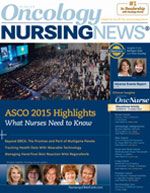Bringing You the Latest Updates From the Year's Largest Oncology Conference
When some 30,000 oncology practitioners, researchers, and patient advocates gather each year for the annual meeting of the American Society of Clinical Oncology (ASCO), we've come to count on some pretty important research updates emerging from that gathering. This year's meeting-ASCO's 51st-proved no exception.
OncLive Chairman,
Mike Hennessy
When some 30,000 oncology practitioners, researchers, and patient advocates gather each year for the annual meeting of the American Society of Clinical Oncology (ASCO), we’ve come to count on some pretty important research updates emerging from that gathering. This year’s meeting—ASCO’s 51st—proved no exception.
In this month’s cover story, we present some highlights of the meeting, alongside perspectives written by your peers on the impact these developments may have on your practice.
Progress on the immunotherapy front continued to grab headlines at ASCO, among them, nivolumab demonstrating superiority over docetaxel in the treatment of a number of lung cancer subtypes and pembrolizumab showing real promise in the treatment of hard-to-treat advanced head and neck cancer. ASCO brought more good news on the survivorship front, with researchers reporting that survivors of childhood cancers are living longer due to better treatments and improved follow-up care. We cover all of these developments and more in our special 2-credit CE activity, beginning on page 26.
Our editorial team also was on hand for the 9th Annual Joining FORCES Against Hereditary Cancer Conference, held this year in Philadelphia. In this issue, we share expert insights on what the explosion in genetic testing options means for your patients. We also spoke with FORCE’s executive director about the group’s patient-powered ABOUT research registry that’s capturing real-world information from those directly or indirectly affected by hereditary cancer risk. Be sure to visit the OncNurseTV portal on Nursing.OncLive.com for more coverage of the FORCE meeting.
Also in this issue, we hear from oncology nurse navigator and Oncology Nursing News board member Penny Daugherty, who found herself in the unenviable position of switching places when her husband was diagnosed with melanoma. That experience allowed Daugherty to witness firsthand the difference a navigator can make: “After my experience as a wife who was by her husband’s side through his cancer diagnosis and surgery, I can say that I now fully understand the breadth—and the depth—of our role as nurse navigators.”
We couldn’t agree more, and we hope that you will find the research highlights and peer perspectives you find in this issue helpful in your daily practice.

Innovative Program Reduces Nurse Turnover and Fosters Development
Published: September 12th 2024 | Updated: September 12th 2024The US Oncology Network (The Network) has developed one of the most comprehensive programs in the nation to support the professional development and retention of new oncology nurses.


